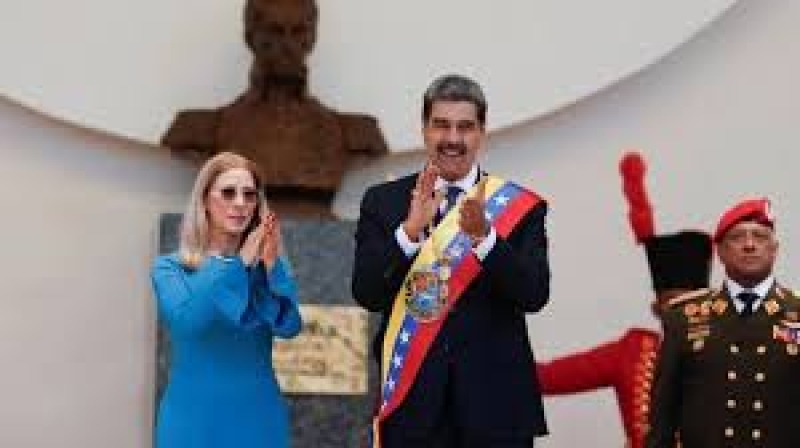- Security Council Divided on United States' Venezuela Action |
- Over 1.53m voters register for postal balloting: Shafiqul Alam |
- Bangladesh Bank to liquidate 9 NBFIs in financial sector reforms |
- Govt Moves to Clear Tk20,000cr Dues to Avoid Summer Outages |
- Maduro Pleads Not Guilty in US Court, Claims Presidency |
US Offers $25M Reward for Arrest of Venezuela’s Maduro

Venezuelan President Nicolás Maduro, whose nearly 12 years in power have been marred by a devastating economic and social crisis, was sworn in for a third term on Friday, despite ongoing international calls for his departure and an escalating U.S. reward for his capture.
Maduro, who has ruled since 2013, was declared the winner of July’s contested election by Venezuela’s electoral authority and its top court, though the official results have not been fully disclosed. Despite this, opposition leaders argue that the election was fraudulent, citing ballot box-level evidence showing a massive victory for their candidate, Edmundo González, who is recognized by several countries, including the U.S., as the legitimate president-elect. International observers have also criticized the election as undemocratic.
The situation has only intensified since the election, with González fleeing to Spain in September, opposition leader María Corina Machado going into hiding within Venezuela, and the detention of numerous political figures and protesters.
Though González has promised to return to Venezuela, Machado urged him to delay his return, citing concerns for his safety. "Edmundo will come to Venezuela to be sworn in as constitutional president at the right time,” Machado said in a video posted Friday. “His safety is paramount in this moment of struggle.”
The Venezuelan government has reacted forcefully, warning that González would be arrested upon his return and offering a $100,000 reward for information leading to his capture.
Meanwhile, in a direct response to the ongoing political crisis, the Biden administration increased its reward for information leading to the arrest or conviction of Nicolás Maduro on drug trafficking charges to $25 million, up from the previous $15 million. The U.S. also announced similar rewards for other top officials, including Interior Minister Diosdado Cabello ($25 million) and Defense Minister Vladimir Padrino ($15 million), alongside new sanctions targeting several high-ranking figures, including those in the state-run oil company PDVSA.
Maduro, who has long dismissed such accusations, rejected the U.S. charges as politically motivated and continues to accuse Washington of attempting to undermine Venezuela’s sovereignty. During his inauguration, he described the U.S. sanctions as part of an “economic war” designed to destabilize the country.
Secretary of State Antony Blinken condemned the inauguration as illegitimate, reaffirming the U.S. stance of non-recognition of Maduro’s presidency. "The Venezuelan people and the world know the truth – Maduro clearly lost the 2024 election and has no right to claim the presidency," Blinken said.
In Venezuela, Maduro's ceremony was attended by some 2,000 guests from 125 countries, including Cuban President Miguel Díaz-Canel and Nicaraguan President Daniel Ortega, staunch allies of the Maduro government. The president also invoked historical figures, such as the sixteenth-century Indigenous leader Guaicaipuro and his late mentor Hugo Chávez, in a symbolic gesture to strengthen his claim to power.
At the same time, Maduro’s economic policies remain contentious. Venezuela’s ongoing economic crisis—marked by hyperinflation, widespread shortages, and a mass exodus of over 7 million people—has led many, particularly among Machado’s supporters, to demand urgent reforms. While the government has managed to curb inflation to some extent, Maduro’s critics point to persistent poverty and a lack of reliable public services as evidence of the regime’s failure.
Despite the widespread opposition and international sanctions, Maduro’s government continues to present itself as resilient, claiming that the country is on the path to recovery. He even boasted of a 9% economic growth rate in 2024, though many remain skeptical about the authenticity of such figures.
The political standoff between Maduro and his opposition remains at a boiling point, with little hope for reconciliation in sight. The international community watches closely as both sides brace for the next phase of this prolonged political and economic crisis.

